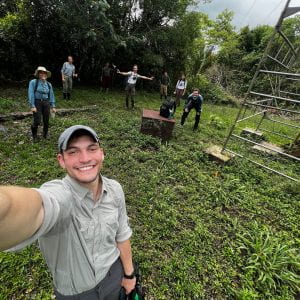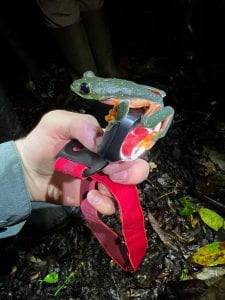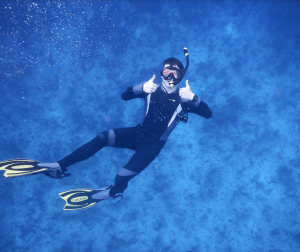Sadly, we have neither a reef nor a rainforest back home in New Mexico. Hot showers and a washing machine are nice, but I would rather be back at Glover’s and LCRS. This class was an incredible and once-in-a-lifetime opportunity to explore two of the most diverse regions in the world, both of which were contained in the small country of Belize. The tropics have an unmatched level of macroscopic diversity, and it was amazing to witness this firsthand. Every time I looked in a crack and crevice, high up in the trees, beneath chunks of coral rubble, under logs and leaf litter, there was always interesting life hiding in plain sight. It was truly unlike anything I have ever experienced.
Our lectures and discussions addressed a multitude of factors that ultimately drive this immense diversity of the neotropics. And although the ocean and rainforest seem to be two different extremes of dissimilar environments, surf and turf have several similarities. One similarity that is present in both environments, yet seems counterintuitive is the fact both a reef and a rainforest are essentially nutrient desserts. Both ocean water and forest soil contain low levels of biologically relevant nutrients, and as a result, organisms have developed creative and sometimes symbiotic/mutualistic strategies to thrive in these nutrient-poor environments. The cycle of nutrients is critical in both of these environments, and unfortunately, both of these regions (and in particular my two taxons: stony corals and amphibians) are particularly sensitive to anthropogenic changes. Both of these regions rely on a high level of constancy to thrive. Corals stressed from temperature increases, eutrophication, heavy metal contamination, ocean acidification, and more, are far more vulnerable to disease and degradation. And amphibian populations have seen significant decreases both because of direct absorption of harmful pollutants through their porous skin and the disruptions of the once incredibly predictable weather patterns that their breeding behavior relies on. So sadly, both these regions are particularly vulnerable to human-driven climate change. Yet, both the rainforest and reef are significant contributors/drivers of the global economy. Humans are incredibly reliant on these ecosystems for resources and protection, and our preservation and coexistence with them is critical for the prosperity of us all. Belize has an incredible amount of untouched forest, and to see the contrast between the Belizean hills covered in forest and the decimated ones across the border in Guatemala which were cleared for slash and burn agriculture was alarming.
I was able to interact with many endangered and rare species, and I would say this would be the most memorable part of the course for me. I will never forget the Morelet’s Tree Frog which jumped on my face or finding small hopeful patches of Acropora cervicornis scattered throughout some of the reefs. It’s sad to think why these regions are experiencing such a rapid decline in diversity and population, yet this hands-on experience has further strengthened my love for biology and possibly shifted my future career away from medicine and towards research.
The list of things I learned in this course could go on for pages yet three that come to mind are:
- Mutualism/symbiosis is everywhere in these environments and the connections and balance between organisms are unimaginably complex. This also leaves them quite vulnerable to human exploitation, climate change, and invasive species.
- The global economy is heavily reliant on these regions in multiple capacities, and the loss of rainforest and reef diversity is not just a loss of cool organisms, but sets in motion cascading instabilities throughout the world both ecologically and economically.
- And field research is a whole different animal compared to laboratory work. Things rarely go as planned and it’s critical to be adaptable and flexible. (Also plan to pack light because everything you bring back is wet and heavy haha)
I am truly thankful for this experience and I hope it is not my last time exploring the tropics. I couldn’t have asked for a better group of TFBs and I hope to see you all again soon!
~Rusty



